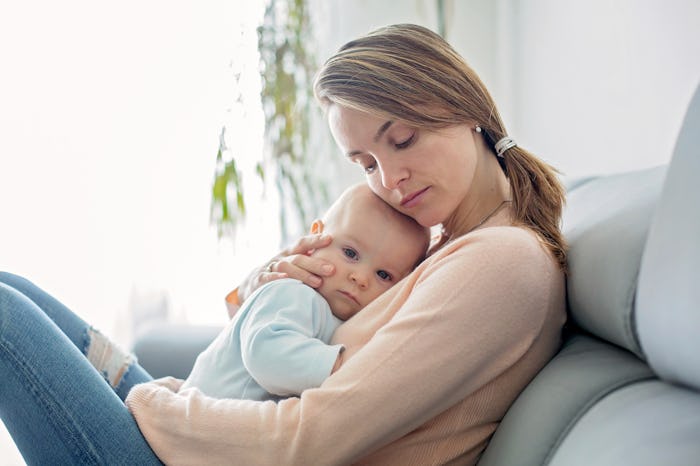Flu season is in full swing, and there's no question it's been brutal this year. With the flu flying through schools and homes, it seems inevitable that you or your kids will catch it (or something like it) at some point. If you have little babies, this might be concerning. How do you know it's the flu and not a cold? Here are 6 signs your baby has the flu, even if they don't have a fever, so you can figure out what's going on.
Though a fast and high fever is typically a surefire sign of the flu, there are instances where someone with the flu doesn't have a fever. But, other common signs of the flu (body aches, loss of appetite, congestion, etc.) could be present. Pediatrician Dr. Alison Mitzner tells Romper, "If there is no fever, your child can have extreme fatigue, cough, or sore throat which causes typically decreased appetite, vomiting and diarrhea. They also may have muscle aches and your baby will be quite fussy." If you're concerned your baby has the flu, you should call your pediatrician to determine next steps, particularly if your baby is under six months old.
Many of the signs of flu are similar for both children and adults, though vomiting and diarrhea are more common among children, noted the Centers For Disease Control And Prevention (CDC). Though the flu and the common cold share many of the same symptoms, "the flu typically comes on quickly and your child will have sudden onset of symptoms, unlike colds, which are more mild and come on more slowly," notes Mitzner. If your kiddo was feeling fine one day but can barely sit up the next, you might be dealing with the flu.
Here are a few other signs that your baby could have the flu, even if that thermometer is telling you otherwise.
1Fatigue
Extreme fatigue and body aches are common with the flu, and can range from mild to severe depending on the child, as mentioned by Kids Health. Your baby might be napping more than usual, less playful, or seem very lethargic.
2Cough Or Sore Throat
The flu can often bring on a dry, hacking cough, which has the potentional to get worse. If your baby seems to be struggling to breathe, is very congested, or seems to have chest pain while breathing or coughing, be sure to call your doctor right away. Those with compromised or undeveloped immune systems (like infants) are prone to other illnesses derived from the flu (like pneumonia), according to Kids Health.
3Chills Or Body Shakes
Though chills and body shakes typically accompany a fever, it's not completely unheard of to have them without a high temperature. Keep an eye on your babe and how their body feels and looks. Uncontrollable chills or shakes could be flu-related, according to March of Dimes.
4Loss Of Appetite
With all of these symptoms and extreme fatigue, loss of appetite is almost a given, and, according to Web MD, one of the most common flu symptoms. Babies might refuse to eat because they are too tired, congested, coughing, or just plain don't feel good. Though they may be able to get by on less food than typical (since they're likely not exerting much energy), hydration is still very important. Try to encourage filling fluids: breast milk or formula for all babies, or soups and broths for older babies.
5Vomiting Or Diarrhea
If your little one is vomiting or has diarrhea, it could be a sign of the flu. The main concern with vomiting and diarrhea is dehydration. Be sure to keep track of your babies wet diapers (at least one very eight hours, according to Cleveland Clinic) to ensure they are adequately hydrated.
6Congestion
Stuffy noses are so common in little ones, it's almost hard to find a kid without a stuffy nose in the winter, isn't it? Runny noses can be a sign of the flu, noted Mayo Clinic, but they are typically accompanied by at least a few of the other symptoms.
Because younger infants and babies are more at risk of complications and severe disease from the flu virus, prevention is even more important for them, notes Mitzner. "It is so important to be sure to vaccinate if your child is six months or older, because their lungs, their immune systems are all developing," she says. Vaccinating is the best way to prevent against the flu, and even if you were to get the flu, it could decrease the severity and duration. It's not too late vaccinate for the flu this season, so talk to your doctor if you haven't already.
Check out Romper's new video series, Bearing The Motherload, where disagreeing parents from different sides of an issue sit down with a mediator and talk about how to support (and not judge) each other’s parenting perspectives. New episodes air Mondays on Facebook.
